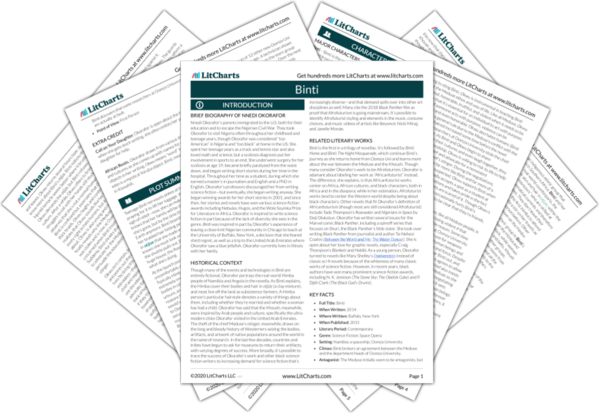Meduse Quotes in Binti
In my culture, it is blasphemy to pray to inanimate objects, but I did it anyway. I prayed to a metal even my father had been unable to identify. I held it to my chest, shut my eyes, and I prayed to it, I am in your protection. Please protect me.

Unlock explanations and citation info for this and every other Binti quote.
Plus so much more...
Get LitCharts A+We’d all been taught this Meduse form of killing in history class. The Khoush built the lessons into history, literature, and culture classes across several regions. Even my people were required to learn about it, despite the fact that it wasn’t our fight. The Khoush expected everyone to remember their greatest enemy and injustice. They even worked Meduse anatomy and rudimentary technology into mathematics and science classes.
“Evil thing,” I heard the one called Okwu say. Of all the voices, that one I could recognize. It was the angriest and scariest. The voice sounded spoken, not transmitted in my mind. I could hear the vibration of the “v” in “evil” and the hard breathy “th” in “thing.” Did they have mouths?
I couldn’t give all my otjize to this Meduse; this was my culture.
I sat up straight, ignoring the fatigue trying to pull my bones to the bed. “I am Binti Ekeopara Zuzu Dambu Kaipka of Namib.” I considered speaking its single name to reflect its cultural simplicity compared to mine, but my strength and bravado were already waning.
I frowned at it. Realizing something. It spoke like one of my brothers, Bena. I was born only three years after him yet we’d never been very close. He was angry and always speaking out about the way my people were maltreated by the Khoush majority despite the fact that they needed us and our astrolabes to survive. He was always calling them evil, though he’d never traveled to a Khoush country or known a Khoush. His anger was rightful, but all that he said was from what he didn’t truly know.
“In your university, in one of its museums, placed on display like a piece of rare meat is the stinger of our chief,” it said. I wrinkled my face, but said nothing. “Our chief is...” it paused. “We know of the attack and mutilation of our chief, but we do not know how it got there. We do not care. We will land on Oomza Uni and take it back.”
Spongy. As if it were full of the firm jelly beads in the milky pudding my mother liked to make. I could sense current all around me. These people had deep active technology built into the walls and many of them had it running within their very bodies. Some of them were walking astrolabes, it was part of their biology.
“Was it the sting?” I asked.
“No,” it said. “That is something else. You understand, because you truly are what you say you are—a harmonizer.”
Several of the human professors looked at each other and chuckled. One of the large insectile people clicked its mandibles. I frowned, flaring my nostrils. It was the first time I’d received treatment similar to the way my people were treated on Earth by the Khoush. In a way, this set me at ease. People were people, everywhere. These professors were just like anyone else.
“You’ve never seen the Meduse, either. Only studied them...from afar. I know. I have read about them too.” I stepped forward. “Or maybe some of you or your students have studied the stinger you have in the weapons museum up close.”
The spiderlike Haras raised two front legs and spoke in the language of the Meduse and said, “On behalf of all the people of Oomza Uni and on behalf of Oomza University, I apologize for the actions of a group of our own in taking the stinger from you, Chief Meduse. The scholars who did this will be found, expelled, and exiled. Museum specimen of such prestige are highly prized at our university, however such things must only be acquired with permission from the people to whom they belong. [...] We will return it to you immediately.”
I’ll never forget the way the chief’s body went from blue to clear the moment the stinger became a part of it again. Only a blue line remained at the point of demarcation where it had reattached—a scar that would always remind it of what human beings of Oomza Uni had done to it for the sake of research and academics.












